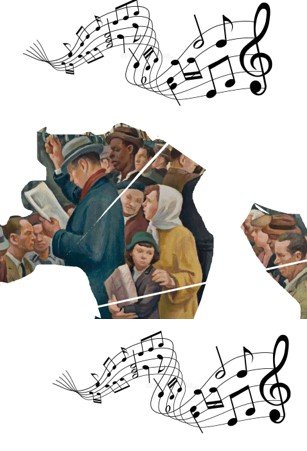Little Worries: Print Series, by Sarah Ellis
NMR is a shared space among academics, artists, and activists to highlight and discuss their work. The artist in residence is chosen each year to share their work with the journal’s readership. Their work will be featured both in the print journal and website.
The 2023 artist in residence is Sarah Ellis.
Sarah is the Assistant Professor of Printmaking in the Department of Art and Design at Jacksonville State University. Her personal studio work consists of predominantly printmaking, paper arts, illustration, and sculpture. Sarah is a member of the LGBTQ+ community and participates in JSU’s Safe Zone program as a Facilitator. When she isn’t working, she enjoys self-care practices that include cooking, rock climbing, and spending time with her partner & her cat.
Our Sacred Underground: Fiction, by Marc Alexander Valle
Death, adolescent friendship, and the secret enclaves that surround us everyday. Read more with this short story by Marc Valle.
“Interview with Audrey Grison: Disability, Art, and the Self,” Audrey Grison and Wesley R. Bishop
Part of NMR’s mission is to create a space where both academic and non-academic writers, activists, and artists can read, share, and engage one another’s work. The journal’s managing editor, Wesley R. Bishop, met with French artist and disability rights activist Audrey Grison to discuss her work over the summer. The following conversation has been edited for clarity and length.
Cover photo by Marie Marchandise.
Book Review: The Good Hand
John Lepley reviews “The Good Hand.”
Lepley is a labor educator in Pittsburgh, Pennsylvania. From 2006-2008 he was a recipient of the Gertrude and Theodore Debs Memorial Fellowship in the graduate program in labor and social reform movement history at Indiana State University in Terre Haute, Indiana.
Book Review: The Peacemaker’s Path
Charlie Wiles reviews “The Peacemakers’s Path.” Wiles is the founder and executive director of the Indianapolis based Center for Interfaith Cooperation.
Insurgent Publishing for the Resistance
Timothy Sheard of Hardball Press writes about the importance of small presses, editing, and promoting working class social movements for positive change.
New York City’s Composers’ Collective: “Left-Wing Fool’s Paradise”or “American Musical Genesis”?
In response to the growing unemployment and social misery of the early Depression years, the Composers’ Collective, founded in 1932–1933 in New York City, sought to make a social and political impact. Laying out the collective’s theoretical and ideological ambitions, this article highlights the organization’s initial agenda of political education and mass mobilization through avant-garde classical music. These efforts shifted as the collective’s members realized that their outreach efforts were failing, and they changed their focus from classical avantgarde music to folk music. This article argues that despite its short existence (1932–1936), the collective fostered a theoretical discourse about the political significance of music that influenced the later works of former members (e.g., Marc Blitzstein, Earl Robinson) a new generation of political musicians (e.g., Pete Seeger), and exemplifyied the important role music could play in America’s political stage.



















